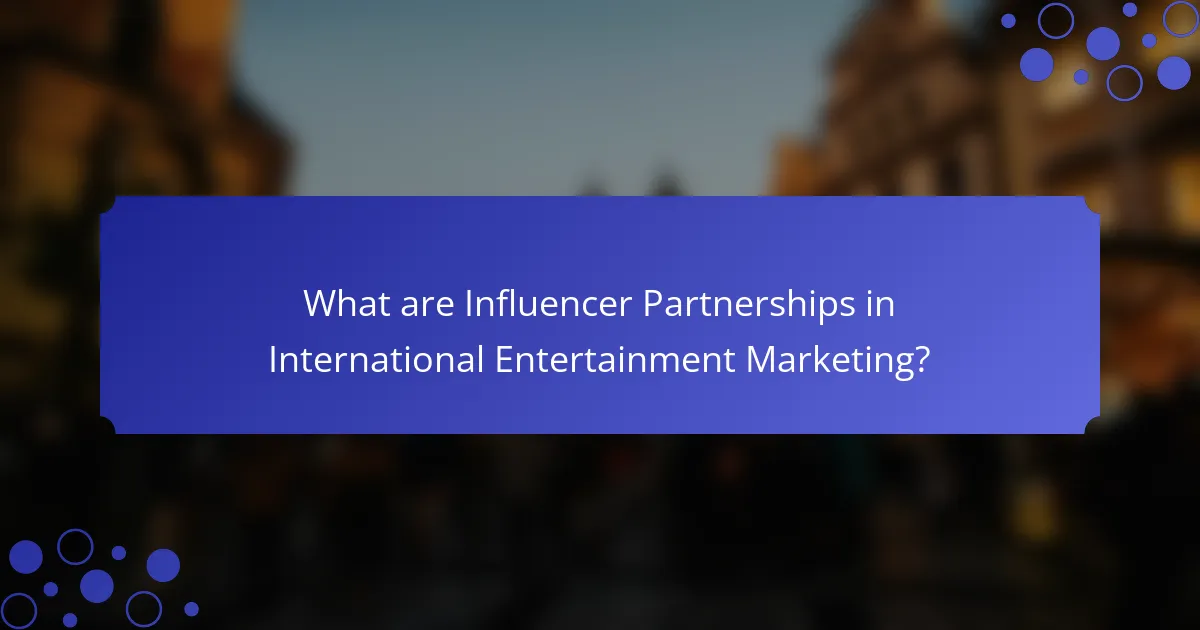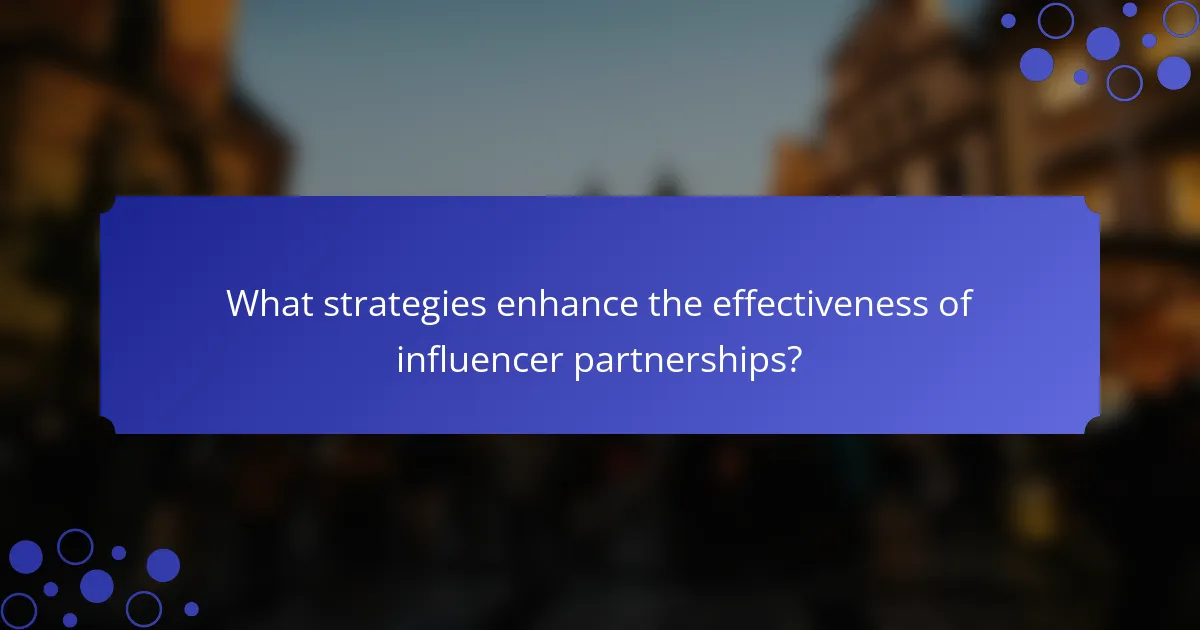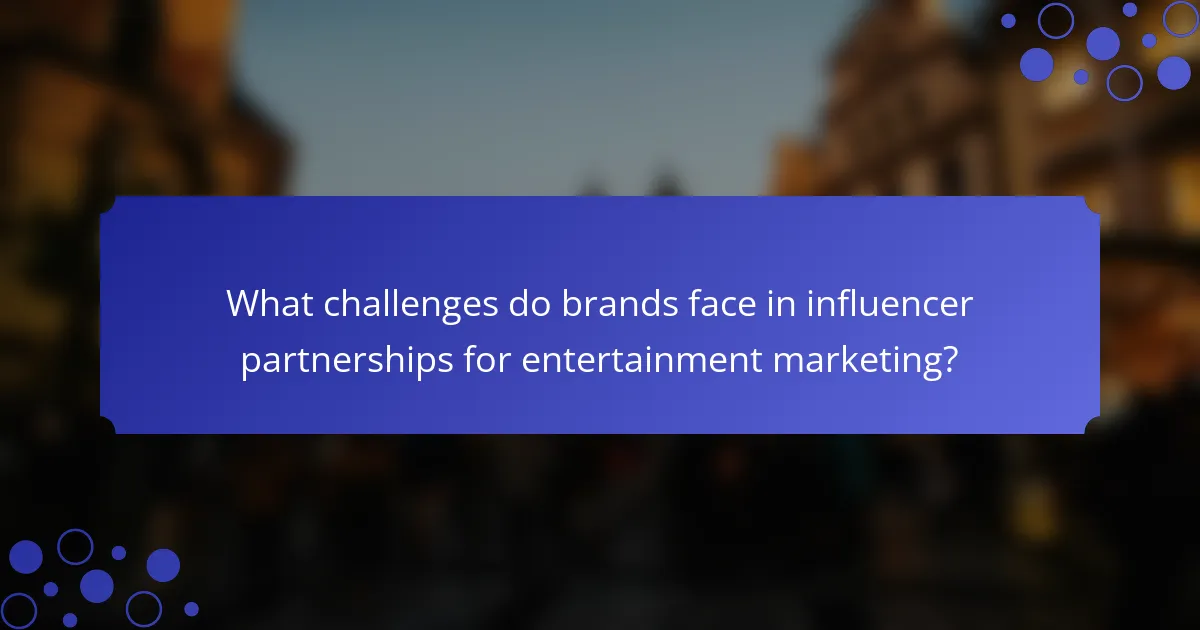Influencer partnerships are collaborative efforts between brands and social media influencers aimed at promoting entertainment products or services. These partnerships utilize the influencer’s audience to enhance brand visibility and credibility across diverse markets, with research indicating that 49% of consumers trust influencer recommendations. Effective strategies for these partnerships include aligning brand values with influencer authenticity, choosing influencers that match target demographics, and allowing creative freedom for genuine content creation. However, brands face challenges such as finding suitable influencers, measuring campaign effectiveness, and navigating compliance with advertising regulations. This article explores the significance of influencer partnerships in international entertainment marketing, detailing strategies for success and potential obstacles.

What are Influencer Partnerships in International Entertainment Marketing?
Influencer partnerships in international entertainment marketing are collaborations between brands and social media influencers. These partnerships leverage the influencer’s audience to promote entertainment products or services. Influencers create content that showcases the brand, often sharing it across their platforms. This approach enhances brand visibility and credibility in diverse markets. Research shows that 49% of consumers rely on influencer recommendations. Additionally, influencer marketing can yield an average ROI of $5.78 for every dollar spent. These statistics highlight the effectiveness of influencer partnerships in reaching global audiences.
How do influencer partnerships function within the entertainment marketing landscape?
Influencer partnerships function as strategic collaborations between brands and individuals with significant social media followings. These partnerships leverage the influencer’s reach to promote entertainment products or services. Influencers create authentic content that resonates with their audience, enhancing brand visibility. This approach often leads to increased engagement and conversion rates for marketing campaigns.
According to a 2021 study by Influencer Marketing Hub, businesses earn an average of $5.78 for every dollar spent on influencer marketing. This statistic underscores the effectiveness of influencer partnerships in driving sales. Additionally, influencers often provide insights into audience preferences, allowing brands to tailor their strategies effectively.
Overall, influencer partnerships are integral to the entertainment marketing landscape, providing unique avenues for brand promotion and audience connection.
What roles do influencers play in shaping audience perceptions?
Influencers play a critical role in shaping audience perceptions through their ability to create relatable content. They establish trust with their followers by sharing personal experiences and opinions. This trust translates into influence over purchasing decisions and brand loyalty. According to a 2021 survey by the Digital Marketing Institute, 49% of consumers rely on influencer recommendations for their buying choices. Influencers also help to humanize brands, making them more approachable and relatable. By showcasing products in authentic settings, they create a narrative that resonates with audiences. Additionally, influencers can drive trends and set cultural standards, impacting how audiences perceive various topics. Their reach and engagement can amplify messages, allowing brands to connect with diverse demographics effectively.
How do influencers collaborate with brands in entertainment?
Influencers collaborate with brands in entertainment through sponsored content, product placements, and social media promotions. These collaborations often involve influencers showcasing or endorsing a brand’s products or services. Influencers create engaging content that aligns with the brand’s image. They leverage their audience to enhance brand visibility and reach. Research shows that 49% of consumers depend on influencer recommendations when making purchase decisions. Brands benefit from the trust and authenticity that influencers provide. This partnership is mutually beneficial, as influencers gain financial compensation and brands gain exposure to targeted audiences.
Why are influencer partnerships important for international campaigns?
Influencer partnerships are important for international campaigns because they enhance brand visibility and credibility across diverse markets. Influencers have established trust with their audiences, which can lead to higher engagement rates. They help brands navigate cultural nuances and local trends effectively. Collaborating with influencers allows brands to tailor their messaging to resonate with specific demographics. According to a study by Nielsen, 92% of consumers trust recommendations from individuals over brands. This trust translates into increased conversion rates and customer loyalty. Additionally, influencers can provide valuable insights into market preferences and consumer behavior. They often have access to analytics that can inform campaign strategies. Overall, influencer partnerships are a strategic asset for international marketing success.
What advantages do influencers provide in reaching global audiences?
Influencers provide significant advantages in reaching global audiences. They possess established trust with their followers. This trust leads to higher engagement rates compared to traditional advertising. Influencers can create relatable content that resonates across diverse cultures. Their ability to tailor messages for specific demographics enhances relevance. Additionally, influencers often have access to analytics that inform effective strategies. According to a 2020 study by Influencer Marketing Hub, brands earn an average of $5.78 for every dollar spent on influencer marketing. This demonstrates the financial effectiveness of influencer partnerships in global outreach.
How do cultural differences impact influencer effectiveness?
Cultural differences significantly impact influencer effectiveness by shaping audience perceptions and engagement. Different cultures have unique values, beliefs, and communication styles. These factors influence how audiences relate to influencers. For instance, humor that resonates in one culture may be offensive in another. Research indicates that culturally relevant content increases trust and relatability. A study by the Journal of Marketing found that culturally tailored messaging can boost engagement rates by up to 50%. Additionally, influencers must adapt their content to align with local customs and preferences. This adaptation enhances authenticity and strengthens influencer-audience relationships.

What strategies enhance the effectiveness of influencer partnerships?
Effective strategies for influencer partnerships include aligning brand values with influencer authenticity. Brands should choose influencers whose audiences match their target demographics. This alignment increases engagement rates and conversion potential. Additionally, providing influencers with creative freedom fosters genuine content creation. Research shows that 70% of consumers trust influencer recommendations over traditional ads. Clear communication of campaign goals ensures that influencers understand the brand message. Regular performance analysis helps refine strategies for future partnerships. Finally, long-term collaborations build stronger relationships and brand loyalty.
How can brands select the right influencers for their campaigns?
Brands can select the right influencers for their campaigns by assessing audience alignment, engagement metrics, and authenticity. Audience alignment ensures the influencer’s followers match the brand’s target demographic. Engagement metrics, such as likes, comments, and shares, indicate how well the influencer connects with their audience. Authenticity is crucial; influencers should have a genuine connection to the brand’s values.
Research shows that 67% of consumers trust influencer recommendations more than traditional advertisements. Brands should also review past collaborations to gauge effectiveness. Tools like social media analytics can help evaluate these factors. By combining these strategies, brands can make informed decisions that enhance campaign success.
What criteria should brands consider when evaluating potential influencers?
Brands should consider audience engagement, relevance, authenticity, and reach when evaluating potential influencers. Audience engagement reflects how well the influencer interacts with their followers. High engagement rates indicate a loyal and active audience. Relevance is crucial; the influencer’s content should align with the brand’s values and target market. Authenticity builds trust, making followers more likely to respond positively to brand promotions. Reach measures the influencer’s potential audience size, impacting the brand’s visibility. A study by Influencer Marketing Hub found that 63% of marketers believe engagement is the most important factor in influencer effectiveness.
How does audience alignment influence partnership success?
Audience alignment significantly influences partnership success by ensuring that both parties reach a compatible target demographic. When influencers and brands share a similar audience, their messaging resonates more effectively. This alignment enhances engagement rates and drives higher conversion rates. Research indicates that partnerships with aligned audiences can increase brand trust by 70%. Moreover, aligned audiences are more likely to respond positively to collaborative campaigns. This synergy fosters authentic connections, which are crucial in entertainment marketing. Ultimately, audience alignment leads to more successful and sustainable partnerships.
What are the best practices for managing influencer relationships?
Establish clear communication channels to manage influencer relationships effectively. Regular updates and feedback ensure alignment on goals. Set mutual expectations regarding deliverables and timelines. Create contracts that outline responsibilities and compensation. Monitor performance metrics to evaluate the success of collaborations. Foster personal connections to build trust and loyalty. Provide influencers with creative freedom to maintain authenticity. Recognize and appreciate their contributions to strengthen the partnership.
How can brands maintain authentic communication with influencers?
Brands can maintain authentic communication with influencers by fostering genuine relationships. This involves regular, transparent interactions that prioritize mutual understanding. Brands should listen actively to influencers’ feedback and ideas. Providing creative freedom allows influencers to express their authentic voice. Collaborating on content creation enhances authenticity and relevance. Setting clear expectations and guidelines ensures alignment without stifling creativity. Building trust through consistent engagement leads to stronger partnerships. According to a 2022 survey by Influencer Marketing Hub, 63% of marketers believe authenticity is crucial for influencer partnerships.
What tools and platforms assist in managing influencer partnerships?
Tools and platforms that assist in managing influencer partnerships include AspireIQ, Upfluence, and Traackr. AspireIQ offers a comprehensive influencer marketing platform that streamlines collaboration and relationship management. Upfluence provides a database of influencers and analytics for campaign tracking. Traackr focuses on influencer relationship management with tools for discovery and performance measurement. These platforms enable brands to efficiently manage campaigns and measure ROI. According to a 2023 report by Influencer Marketing Hub, 67% of marketers find influencer partnerships more effective when using dedicated tools.

What challenges do brands face in influencer partnerships for entertainment marketing?
Brands face several challenges in influencer partnerships for entertainment marketing. One major challenge is finding the right influencer whose audience aligns with the brand’s target demographic. Brands must also navigate the authenticity of influencers, as audiences value genuine endorsements. Another challenge is measuring the effectiveness of influencer campaigns, as metrics can vary widely. Additionally, brands face potential reputational risks if an influencer engages in controversial behavior. Compliance with advertising regulations is also a concern, as failure to disclose partnerships can lead to legal issues. Finally, budget constraints can limit the ability to engage top-tier influencers. These challenges require careful planning and strategy to mitigate risks and maximize impact.
How can brands navigate potential risks in influencer collaborations?
Brands can navigate potential risks in influencer collaborations by conducting thorough research on influencers. This includes analyzing their audience demographics and engagement metrics. Brands should also ensure that influencers align with their values and messaging. Establishing clear contracts that outline expectations and deliverables is crucial. Monitoring influencer content for compliance with guidelines can mitigate reputational risks. Additionally, maintaining open communication with influencers fosters a collaborative relationship. Regularly assessing the performance of collaborations helps brands adjust strategies as needed. According to a study by Influencer Marketing Hub, 63% of marketers believe that clear expectations are essential for successful influencer partnerships.
What common pitfalls should brands avoid when working with influencers?
Brands should avoid several common pitfalls when working with influencers. One major pitfall is not aligning the influencer’s values with the brand’s message. Misalignment can lead to inauthentic campaigns that fail to resonate with audiences. Another pitfall is neglecting to establish clear communication and expectations. Without clarity, campaigns can be mismanaged or deliver unsatisfactory results. Brands often overlook the importance of audience research. Failing to understand the influencer’s audience can result in targeting the wrong demographic. Additionally, brands may underestimate the time required for effective collaboration. Rushed campaigns can compromise quality and impact. Lastly, brands should avoid focusing solely on follower count. Engagement rates are often a better indicator of an influencer’s effectiveness. Research shows that 63% of marketers believe influencer engagement is more important than follower numbers.
How can brands address negative feedback or controversies involving influencers?
Brands can address negative feedback or controversies involving influencers by responding promptly and transparently. They should acknowledge the issue publicly to demonstrate accountability. Brands must communicate their values clearly and outline steps taken to resolve the situation. Engaging with the audience through open dialogue can help rebuild trust. Monitoring social media for real-time feedback is crucial for timely responses. Collaborating with the influencer to provide a unified message can also mitigate damage. Research shows that brands that handle controversies effectively can recover their reputation within weeks. A study by the Institute of Public Relations indicates that transparency and responsiveness are key factors in maintaining brand credibility during crises.
What metrics should be used to measure the success of influencer partnerships?
Key metrics to measure the success of influencer partnerships include engagement rate, reach, and conversion rate. Engagement rate assesses how actively the audience interacts with the content. This metric is calculated by dividing the total engagement (likes, comments, shares) by the total followers. A higher engagement rate indicates more effective partnerships.
Reach measures the total number of unique users who see the content. This metric is crucial for understanding the potential audience size. Conversion rate tracks the percentage of users who take a desired action, such as making a purchase or signing up for a newsletter. This shows the direct impact of the partnership on business goals.
Additionally, brand sentiment can be evaluated through social listening tools. This metric gauges audience perception before and after the partnership. Tracking these metrics provides a comprehensive view of the partnership’s effectiveness in achieving marketing objectives.
How can brands track engagement and ROI from influencer campaigns?
Brands can track engagement and ROI from influencer campaigns through various metrics and tools. Key performance indicators (KPIs) include reach, impressions, and engagement rates. Brands can analyze social media analytics to measure likes, shares, and comments. Additionally, tracking referral traffic to websites can indicate conversions driven by influencer content. Unique discount codes or affiliate links can help quantify sales generated from campaigns. Surveys and customer feedback can provide insight into brand awareness and perception changes. According to a survey by Influencer Marketing Hub, 63% of marketers find ROI measurement challenging, emphasizing the need for clear tracking methods.
What role does audience feedback play in evaluating partnership effectiveness?
Audience feedback is crucial in evaluating partnership effectiveness. It provides insights into audience perceptions and engagement levels. Feedback informs marketers about the strengths and weaknesses of influencer partnerships. Positive feedback can indicate successful alignment with target demographics. Negative feedback highlights areas needing improvement. According to a study by Nielsen, 92% of consumers trust recommendations from individuals over brands. This underscores the importance of audience sentiment in assessing partnership outcomes. Regularly gathering and analyzing feedback can enhance future collaboration strategies.
What practical tips can enhance the success of influencer partnerships in entertainment marketing?
Establish clear communication to enhance influencer partnerships in entertainment marketing. This ensures both parties align on goals and expectations. Set measurable objectives for campaigns to assess success effectively. Utilize data analytics to track engagement and reach. Choose influencers whose audience matches the target demographic for better resonance. Foster authentic relationships with influencers to encourage genuine promotion. Provide creative freedom to influencers, allowing them to showcase the brand in their unique style. Monitor campaign performance continuously to make necessary adjustments in real-time.
The main entity of the article is influencer partnerships in international entertainment marketing. This article provides a comprehensive overview of how these partnerships function, highlighting their role in enhancing brand visibility and credibility across diverse markets. It discusses the effectiveness of influencer collaborations, including their impact on audience perceptions and engagement rates, as well as strategies for selecting the right influencers and managing relationships. Additionally, the article addresses challenges brands face in these partnerships and offers practical tips for measuring success and navigating potential risks.


